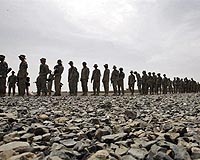| . |  |
. |
Washington (AFP) May 8, 2009 Afghan President Hamid Karzai has demanded an end to US air strikes, which he said killed as many as 130 civilians earlier in the week and were infuriating the public. As US and Afghan investigators prepared to release findings into the bloodshed, Karzai categorically rejected US military suggestions that Taliban insurgents rather than bombings may have been to blame. "Airstrikes are not acceptable," Karzai told CNN on Friday during a visit to Washington. "We believe strongly that airstrikes are not an effective way of fighting terrorism, that airstrikes rather cause civilian casualties." There has been no admission from the US military that it killed civilians in the strikes -- which were called in by Afghan forces under attack by Taliban insurgents in the western province of Farah overnight Monday to Tuesday. But Karzai placed responsibility for the deaths squarely on the shoulders of the US military. "This was definitely caused by bombings," he said. When asked if he was referring to US bombings, he simply responded: "Yes." He did, however, recognize that Taliban use civilians as "human shields." Karzai -- who faces elections in August -- talked tough at the end of a trip to the United States that had been meant to build support for the fight against Taliban and Al-Qaeda extremists across Afghanistan and Pakistan. In meeting with Karzai, US President Barack Obama pledged more caution to avoid civilian casualties and Secretary of State Hillary Clinton voiced regret for the deaths. Karzai held three-way talks with Obama and Pakistani President Asif Ali Zardari, who has been pushing unsuccessfully for an end to US drone attacks inside his country said to have killed top militants but also civilians. Afghan police have told AFP that more than 100 people were killed, about 25 to 30 of them insurgents and the remainder civilians, including elderly people and children. The US military said that the figure was "grossly exaggerated" but did not offer a separate toll. US and Afghan teams were expected to announce findings from their investigation on Saturday. "There were civilian casualties, no doubt," said Colonel Greg Julian, a spokesman in Kabul for US Forces-Afghanistan. "But the conclusion from the investigation has not been reached, and it's inappropriate to indicate one way or the other how they were caused." One of the issues being examined was whether the Taliban had caused the civilian casualties by throwing grenades among villagers, he said. Karzai dismissed the possibility and said the toll could exceed 100. "I got definitive word from the government this morning that there were more than 100 casualties -- nearly 125 to 130 civilians lost. Deaths -- children, women and men -- and it was done by the bombings," he said. In a separate interview with US network NBC to be broadcast Sunday, Karzai said that villages "are not where the terrorists are," according to excerpts made public. "Civilian casualties are undermining support in the Afghan people, for the war on terrorism, and for relations with America. How can you expect a people who keep losing their children to remain friendly?" Karzai asked. International forces in Afghanistan, which number about 70,000 troops, say they take extreme care to avoid harming civilians, aware it does enormous damage to their efforts to gain backing from the population in their fight against the Taliban. On Thursday, hundreds of Farah protesters chanted "Death to America" and demanded that US troops leave Afghanistan because they were harming civilians, witnesses said. The military accuses the insurgents of deliberately using civilian positions as cover. "When the insurgents use civilians as human shields and fire upon coalition forces, there is a possibility of civilian casualties and we do everything we can to avoid that," Julian told AFP. In a vitriolic, nearly 600-word statement posted on its website and addressed to the nation, the Taliban charged that foreign troops were killing civilians deliberately to make them give up their "resistance." It warned that "shedding the blood of one innocent Afghan will in fact lead to the opening of a new invincible trench of revenge against the infidel aggressors." Obama has made fighting the Taliban in Afghanistan and Pakistan a top priority of his young presidency. Military operations started in 2001 after the September 11, 2001 attacks on the United States. Share This Article With Planet Earth
Related Links News From Across The Stans
 In Afghan 'desert of death,' a giant US military base emerges
In Afghan 'desert of death,' a giant US military base emergesCamp Leatherneck, Afghanistan (AFP) May 8, 2009 In the forbidding Afghan desert, US engineers are carving out a sprawling military camp as part of a dramatic American troop build-up designed to confront Taliban insurgents. The desolate plain in southern Helmand province that Afghans call the "desert of death" has turned into a hive of frenetic activity, underscoring President Barack Obama's decision to expand the US military commitment to ... read more |
|
| The content herein, unless otherwise known to be public domain, are Copyright 1995-2009 - SpaceDaily. AFP and UPI Wire Stories are copyright Agence France-Presse and United Press International. ESA Portal Reports are copyright European Space Agency. All NASA sourced material is public domain. Additional copyrights may apply in whole or part to other bona fide parties. Advertising does not imply endorsement,agreement or approval of any opinions, statements or information provided by SpaceDaily on any Web page published or hosted by SpaceDaily. Privacy Statement |